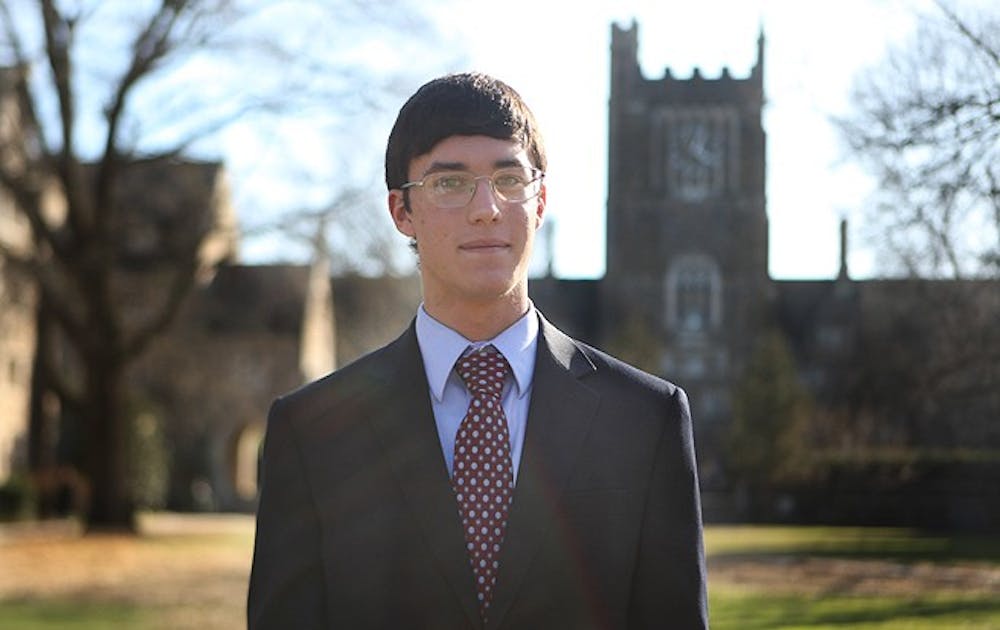Sophomore Nikolai Doytchinov, candidate for Duke Student Government executive vice president, comes from Massachusetts. Doytchinov has been involved in student government for several years, starting before he came to Duke. He currently serves as DSG vice president for academic affairs and served last year as senator-at-large for academic affairs. He is also a member of the Academic Affairs Committee of the Board of Trustees and a student representative on the Provost’s Advisory Council on Bass Connections. The Chronicle’s Elizabeth Djinis sat down with him to discuss his candidacy and what he hopes to achieve if elected in the March 7 election.
The Chronicle: Why do you want to be executive vice president?
Nikolai Doytchinov: The role of EVP has always sort of been [about] the constitution and how it’s always functioned—to preside over the senate, run the internal affairs at DSG. That’s been a passion of mine since I joined last year, which is why I’ve worked with the DSG community for two years. I’ve been involved with leading various selection processes, which translates very directly to the role of EVP. At the same time, I do want to change the role of EVP a little bit and do more policy work and advocacy work and establish an effective senate. When DSG is working effectively, you can use that tool as an ally. If your money’s not being allocated well, senators don’t know what you’re doing right. You need a lot of people working to be a good advocate.
TC: How would you characterize the role of the EVP?
ND: First and foremost, the EVP is the manager of DSG’s internal affairs. The EVP needs to preside over the senate, make sure legislation is well-written and effectively debated and oversee the committee structure of DSG. The EVP can also work on projects in collaboration with the president or independently and advocate on issues for students. It’s a prerequisite that the senate can back us up, but the [EVP] should pass well written resolutions, work with students and ally [with the advocates].
TC: Why are you qualified for this position?
ND: My first [qualification] would be my extensive knowledge of all the rules. Robert’s Rules of Order, DSG bylaws, DSG constitution.... I’ve also written a lot of the bylaw amendments, so I’ve very familiar with how DSG operates. I’m also a great manager of people and human resources. In my committee, that’s been really relevant in how I’ve handled the ad hoc process. I’ve invited people who are good applicants, [like] former senators, to stay on as just members of my committee without having to work for the full senate. They can be good, passionate project workers and not want to legislate those long meetings. I’ve mentored the senators well.
TC: If elected, what would you hope to accomplish during your term as EVP?
ND: I’d really encourage people to check out my full platform on my website. My primary goals would be to improve communication within DSG and strengthen advocacy on key issues—in particular student conduct, alcohol and housing. One area that really needs a radical overhaul is student conduct. What’s being targeted for enforcement are things which are harmless or trivial. We need to stop punishing drinking behaviors that are fairly safe and responsible....
We also need to work on clarifying the hazing policy. Basically, people have gotten in trouble for things that are absolutely not hazing, like wearing a suit to section or a white dress for formal. We need to hammer out a reasonable person test, based on whether a reasonable person would consider it hazing and fight back for some procedural rights that students used to enjoy in the past....
Another really important thing is to really try to bring back the requirement that an official review occur before students and faculty before policies can be changed.... It used to be that before you could change those policies, you’d have to consult students and faculty. [Vice President for Student Affairs] Larry Moneta has unilateral power to undermine any undergraduate policy. The statute of limitations [for reporting sexual misconduct] got reduced to one year, and we had to fight a retroactive battle to take it away. It’s really dangerous to give one person the authority to change any policy at any time, and it needs to be a more deliberate process.
TC: What qualities make you stand out?
ND: It’s going to be the detail with which I’ve thought about all my goals—the specificity as well as the commitment that I’ve made, posting all that online with dates of when I’m going to do these things. It’s the depth with which I’ve thought about the issues and the detail with which I’m committed to working with them. I would just say that I’ve got the experience and passion for the role of EVP, but I’m also not lacking on the policy. In fact, I’ve gotten into far more depth in terms of outlining specific policy items and the days in which I’m committed than the other candidate.
Get The Chronicle straight to your inbox
Signup for our weekly newsletter. Cancel at any time.

